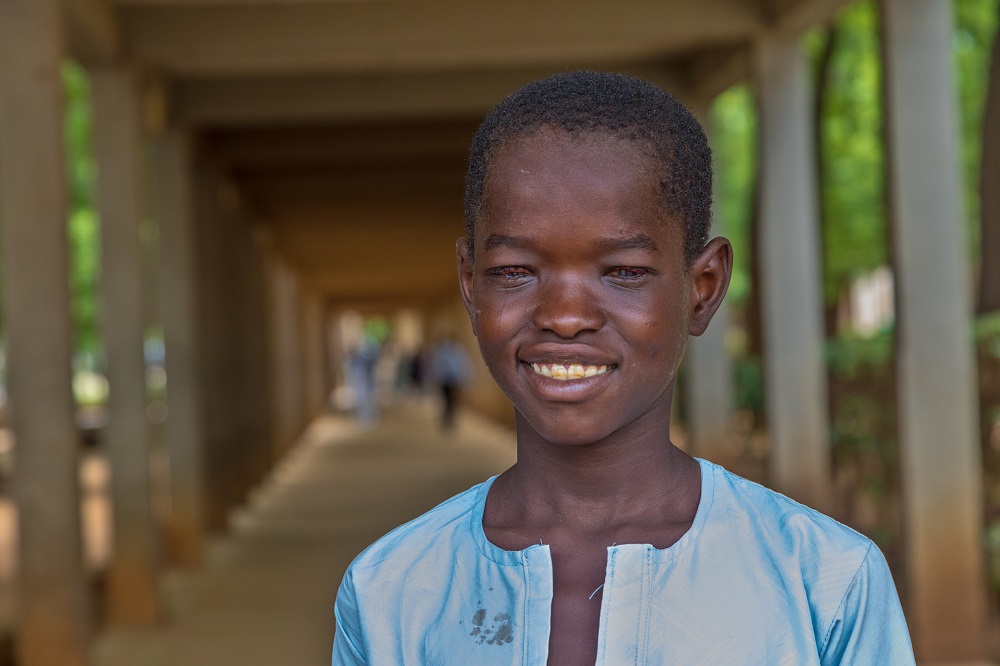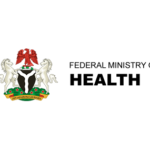Health workers didn’t find him until he was 14. Isah had a severe form of trachoma, a painful eye disease that turns the eyelids inwards.
It caused his eyelids to painfully scratch his eyeballs. He was in a Sokoto rural community, more than 48 kilometres away from the nearest hospital.
He constantly rubbed his eyes because of the painful itching. A thick discharge made him uncomfortable.
The pain became worse when the weather was hot, then the itch would become uncontrollable. His family had been extremely worried he would go blind. His education was at stake.
Boys his age are loud and outspoken. Isah was quiet, very quiet. His speech was in monosyllables— “yes’, “no” and “ok” were the most words he could manage, healthworkers were told.
With his sight failing, school was difficult. He learnt by memorising. He wanted to go to school, though, and wants to be a teacher when he grows up.
Isah lives with his brother Adullahi Dambala, who describes him as not feeling good and not comfortable.
In 2019, Isah went in for a surgery, funded by UKAid.
He recalls the itch, tears and pain. “Now there is a clear difference because previously I felt pains, there was itchiness and all that. But now I feel perfectly fine,” he says.
“I could not farm very well before, but now I can farm very well. Previously I could not read very well, but now I can read very well. I feel there are things that I couldn’t do before, especially work. Now I can work properly – Farming, fetching the corn, and also peeling mealies. That’s the kind of work I do.”
When the bandages were removed, onlookers described that he looked from face to face, clearly seeing the people around him. He still didn’t talk much but he smiled for the first time and just couldn’t stop.
But his experience could be denied thousands of people, after the UK government made a decision to cut aid to finance treatment for neglected tropical diseases (NTDs).

Neglected diseases
NTDs are a diverse group of 20 illnesses that disproportionately affect impoverished communities in tropical areas.
The World Health Organization reports great progress has been made in the treatment of many of these life-threatening and debilitating diseases.
In Africa, 17 countries have eliminated at least one NTD. A further 12 countries are on track to eliminate an NTD in the next three years – an extraordinary feat based on years of determined action.
Despite these progresses, the UK Government has decided to withdraw aid that protects the poorest and most vulnerable children and adults from neglected tropical diseases (NTDs).
The decision to cut funding will mean over £150 million – that’s around N85.4 billion – of committed funding to NTDs this financial year (April 2021 to March 2022) will be cut.
This commitment would have supported at-risk communities across 26 countries by delivering over 250 million treatments.
It would have also supported 180,000 disability-preventing surgeries, whilst strengthening health systems and building the health workforce in-country.
Mass drug administration and assessment has already been affected by the pandemic.
The UK cuts, if effected, will mean 77.1 million treatments for neglected tropical diseases may not be delivered.
The UK and the US lead in NTD programme delivery funding. Pharmaceutical companies remain the largest donors to NTD programmes, donating over 13 billion treatments worth billions of dollars to NTD programmes.
“The US Government continues to provide $102 million each year, with multiple contributions from the likes of Japan, Belgium, Germany, UAE, philanthropists and international NGO partners providing further funding,” says Thoko Elphick-Pooley, executive director of Uniting to Combat Neglected Tropical Diseases.
“The UK accounts for a third of all funding, and their sudden exit will significantly set back goals to eliminate NTDs.”

Found at 7
Muzammilu is fondly called Muzi. He was seven when health workers found him suffering from severe trachoma.
He went in for surgery at the same time Isah did.
“My eyes feel well now, I don’t feel the problem anymore. I can see everybody, I can see the table, and the phone there. I don’t feel anything now. When I get home, I’m going to play. I want to see my mum. My brothers and sisters are going to celebrate. I feel alright now, I can see my father properly,” said Muzi.
6 weeks after Muzi’s surgery, Muzi’s father reported on his son’s condition. “I’ve definitely noticed a difference in Muzi. Before the surgery, he didn’t look at you straight. He had to turn his eyes from the left side to look at you, because of the discomfort he had in his eyes. But, since after the surgery, he looks at you straight, boldly, confidently and he doesn’t have any form of discomfort since he had the surgery. He is comfortable.
Some 34 countries have eliminated at least one neglected tropical disease since 2012. In 2019, pharmaceutical companies donated 1.7 billion treatments, and one billion people received treatment.

Caught off guard
The UK’s cut announcement came in the middle of the financial year and implementation cycles for affected countries and implementing programmes, leaving them unprepared.
It “meant that there was a limit on the extent to which countries could step in,” says Elphick-Pooley.
“In addition, this is at a time when countries are seeing the impact of COVID-19 on their economies and grappling with access to the COVID-19 vaccine and health systems that are completely overwhelmed.
“A managed incremental exit would have at least given countries time to explore alternative resources to deliver these programmes, protecting vulnerable members of society, such as school children, and would have been better value for money for the UK taxpayer.”
At the end of January, WHO formally launched a new road map to drive progress toward a world free of NTDs by 2030.
Health officials consider the road map a key piece in ensuring countries build back better after COVID-19 by focusing on resilience and strengthening health systems.
The UK rescinding its decision on cuts could continue saving millions of people like Isah and Muzi.
“I’ve been going to school now, it feels better. The other children treat me fine. I enjoy playing football with my friends. I love reading,” says a jovial Isah.

 Join Daily Trust WhatsApp Community For Quick Access To News and Happenings Around You.
Join Daily Trust WhatsApp Community For Quick Access To News and Happenings Around You.
